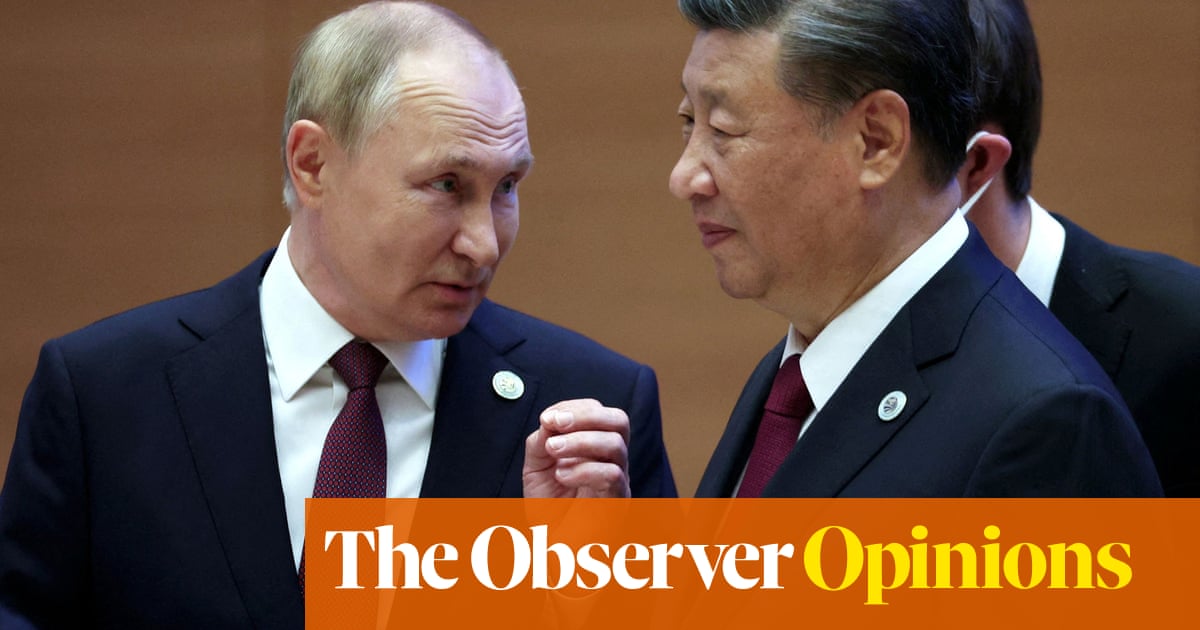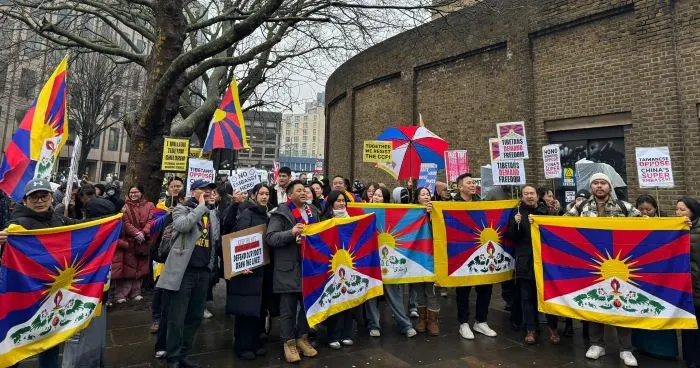What happens if Putin goes nuclear in Ukraine? Biden has a choice to make
Show caption Vladimir Putin and Xi Jinping. Photograph: Sputnik/Reuters Opinion What happens if Putin goes nuclear in Ukraine? Biden has a choice to make Simon Tisdall Russian forces are in retreat yet Nato still holds back for fear of what a humiliated Kremlin might do. But now is precisely the time to step up the pressure Sat 17 Sep 2022 15.25 BST Share on Facebook
Share on Twitter
Share via Email
There has been much excited talk of a “turning point” following Ukraine’s rapid military advances in north-eastern Kharkiv region and what Kyiv cheerily calls its “de-occupation” by fleeing Russians. Less comforting for the western democracies is an alternative theory: that the war is approaching “a moment of maximum danger”.
Worries that a cornered, desperate Vladimir Putin may resort to nuclear, chemical or biological weapons have resurfaced in the US and Europe, along with the argument, articulated by France’s Emmanuel Macron, that Russia’s president, despite his terrible crimes, should not be “humiliated” – and allowed a way out.
Speaking last week, US president Joe Biden said any use by Putin of weapons of mass destruction (WMD) in Ukraine – for example, by exploding a low-yield, tactical nuclear warhead – would “change the face of war”. Russia would become “more of a pariah in the world than they ever have been,” he said.
Yet even as he warned the US response would be “consequential”, Biden refused to say whether it would involve commensurate US or Nato military action. The tenor of his remarks suggested he has not personally raised the nuclear issue with Russia’s leader. This renewed angst about WMD reflects the trap Putin set for the west when he launched his invasion. By placing Russia’s nuclear forces on high alert, deploying nuclear-capable missiles closer to Nato states, and targeting Chornobyl and then the giant Zaporizhzhia nuclear plant, he and flunkeys such as Dmitry Medvedev deliberately played up fears of Armageddon. They hoped to weaken backing for Kyiv and deter direct Nato intervention.
It has worked so far. The US and Nato walked into the trap from the get-go. While supplying Ukraine with ever increasing amounts of arms and materiel, Biden and his allies continue to limit the power, range and quality of such weapons to ensure Putin’s position is not so weakened that he turns to extreme measures.
As a result Nato is still not providing the tanks, missile defences and the air cover Ukrainian forces need to secure liberated areas and press home their advantage. Germany and others take their cue from Washington. Last week, Chancellor Olaf Scholz again demanded Putin withdraw from all Ukrainian territory – while withholding the Leopard tanks Kyiv says are necessary to achieve this end.
The Putin trap has other malign aspects, notably the Kremlin’s economic blitzkrieg on Europe. In effect it is using gas and oil to explode cost-of-living bombshells in every private home, shop and factory. EU politicians who thought they could reason with Putin are enmeshed in the very war-like confrontation they sought to avoid. Some are wavering.
Putin’s meeting last week with Xi Jinping does not seem to have gone smoothly, with China’s president echoing Indian criticism of the damaging global impact of the war. But their overall “no limits” partnership appears unaffected. Their shared aim: the evisceration of the post-1945, western-led rules-based order. In this context, Ukraine and Taiwan are prologue.
The uncovering in newly liberated Kharkiv of Bucha-type mass graves and apparent war crimes represents another strand of Putin’s strategy of demotivation. His message to the west: your “universal values” are meaningless in the world I am creating.
There is little Putin won’t do when he feels it is necessary to win on the battlefield.
By contemptuously violating the UN’s authority, the Geneva conventions, and human rights law, he strikes at the heart of western self-belief and confidence.
Not exactly a turning point, then, but a week when other myths were also exploded. Demolished is the defeatist argument that Ukraine cannot prevail and that western military and economic aid only delays the inevitable. Ukraine is winning, for now at least, despite the humming and hawing.
Nor is it any longer assumed Putin’s grip on power is unshakeable. Increasing domestic criticism is heard, not least from his pro-war, nationalist supporters. Their ire is currently aimed at the military high command, but everyone knows who commands the commanders.
Now is not the time to relax the pressure for fear of what Putin might do. On the contrary, it’s time to crank it up. Because, ironically, it’s Putin who is trapped now. He must not escape the consequences of his actions.
For Europe (and the UK), this means expanding the too modest energy measures proposed by EU commission president Ursula van der Leyen last week – and end energy dependence on Moscow. It means sending more, better heavy weapons to Kyiv and redoubling efforts to inform Russians about what, truly, is being done in their name.
It means creating an international criminal tribunal for Ukraine, like that for former Yugoslavia, and the confiscation of frozen Russian sovereign assets to fund reparations, compensation and the rebuilding of the country. It means deploying a military coalition of the willing to secure Zaporizhzhia, as Lithuania proposes.
Daunting challenges remain. Russia still has more tanks and artillery. It still controls one-fifth of Ukraine’s territory. It is mobilising 137,000 additional troops on Putin’s orders and could outnumber its opponents by spring. A ruthless campaign of indiscriminate reprisals against civilian targets has begun, following its recent setbacks.
“There is little he [Putin] won’t do when he feels it is necessary to win on the battlefield,” warned analyst Daniel Davis, a retired US army colonel. But this is not an argument for cutting him some slack.
Don’t give him an inch. Keep him on the run. Show him there’s no way out but back. And if, panicked and vengeful, Putin does indeed threaten to use a tactical nuclear weapon in Ukraine, the response must be hard and clear.
Biden must personally and formally inform him, in advance, that any such attack, breaking the global taboo on nuclear aggression and undercutting international security, would be viewed as an act of war against the US and Nato – with all the awesome, regime-toppling consequences that might entail. Perhaps Biden has already done this. Hopefully he has.
In which case, stop pulling western punches. Get on and ensure Ukraine wins, wins well, and wins soon.
Do you have an opinion on the issues raised in this article? If you would like to submit a letter of up to 300 words to be considered for publication, email it to us at [email protected]













